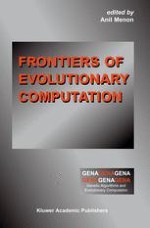2004 | OriginalPaper | Buchkapitel
Solving Combinatorial Optimization Problems Via Reformulation and Adaptive Memory Metaheuristics
verfasst von : Gary A. Kochenberger, Fred Glover, Bahram Alidaee, Cesar Rego
Erschienen in: Frontiers of Evolutionary Computation
Verlag: Springer US
Enthalten in: Professional Book Archive
Aktivieren Sie unsere intelligente Suche, um passende Fachinhalte oder Patente zu finden.
Wählen Sie Textabschnitte aus um mit Künstlicher Intelligenz passenden Patente zu finden. powered by
Markieren Sie Textabschnitte, um KI-gestützt weitere passende Inhalte zu finden. powered by
Metaheuristics - general search procedures whose principles allow them to escape the trap of local optimality using heuristic designs-have been successfully employed to address a variety of important optimization problems over the past few years. Particular gains have been achieved in obtaining high quality solutions to problems that classical exact methods (which guarantee convergence) have found too complex to handle effectively. Typically a metaheuristic method is crafted to suit the particular characteristics of the problem at hand, exploiting to the extent possible the structure available to enable a fruitful and efficient search process. An alternative to this problem specific solution approach is a more general methodology that recasts a given problem into a common modeling format, permitting solutions to be derived by a common, rather than tailor-made, heuristic method.The optimization folklore strongly emphasizes the unproductive consequences of converting problems from a specific class to a more general representation, since the “domain-specific structure” of the original setting then becomes invisible and can not be exploited by a method for the more general problem representation. Nevertheless, there is a strong motivation to attempt such a conversion in many applications to avoid the necessity to develop a new method for each new class. We demonstrate the existence of a general problem representation that frequently overcomes the limitation commonly ascribed to such models. Contrary to expectation, when a specially structured problem is translated into this general form, it often does not become much harder to solve, and sometimes becomes even easier to solve provided the right type of solution approach is applied. The model with this appealing property is the Quadratic Unconstrained Integer Programming (QUIP) problem in binary variables, accompanied by the device of introducing quadratic infeasibility penalty functions to handle constraints. Not only is the model capable of representing a wide range of “special case” problem classes, but it can be advantageously exploited by adaptive memory (tabu search) metaheuristics and associated evolutionary (scatter search) methods. Computational outcomes disclose the effectiveness of this combined modeling and solution approach for problems from a diverse collection of challenging settings.
